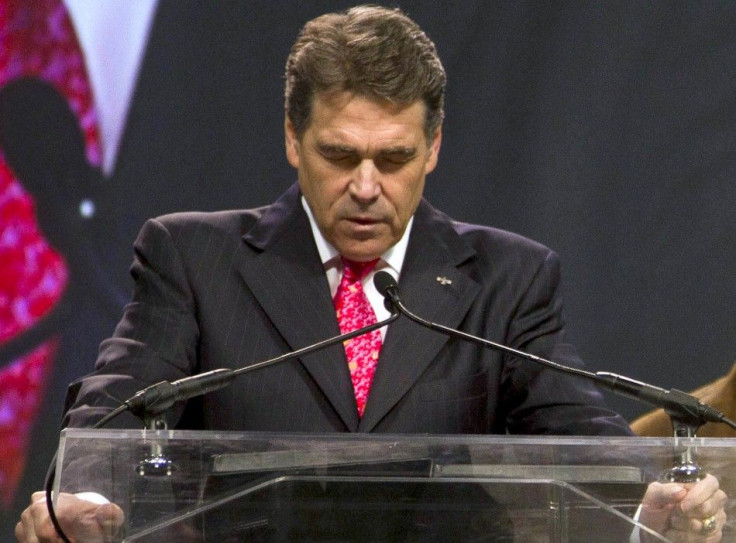Rick Perry launches presidential bid

Rick Perry, the conservative governor of Texas, declared himself a candidate for president on Saturday, shaking up the race for the Republican nomination to face Democratic President Barack Obama in 2012.
Perry made the announcement in a statement issued shortly before he was to address a gathering of conservatives in South Carolina to launch his campaign.
"It is time to get America working again," Perry said in the statement. "That's why with the support of my family and an unwavering belief in the goodness of America, I declare to you today my candidacy for president of the United States."
The three-term Texas governor has touted a record of job growth in Texas and also is known as a strident critic of federal power and an opponent of abortion rights and gay marriage. He is considered a strong fundraiser.
Opinion polls indicate Perry enters the race close on the heels of former Massachusetts Governor Mitt Romney, the early front-runner to win the 2012 Republican nomination.
The announcement by Perry, who has made his deep Christian faith a big part of his public image, came one week after he led a seven-hour religious rally in Houston to pray for America, a nation he described as "in crisis."
In remarks posted before his speech on his campaign's website, Perry said, "As Americans, we believe freedom is a gift from God, and government's prime function is to defend it. We don't see the role of government as a nanny state, and we recognize there is no government money that wasn't once earned through the sweat and toil of private citizens."
Perry sharply criticizes the Obama administration in the remarks.
"That's why we object to an administration that sees its role as spending our children's inheritance on failed economic theories that have given us record debt and left far too many unemployed, threatening not only our economy, but our security. Our reliance on foreign creditors and sources of energy not only compromises our national sovereignty, but jeopardizes our national future," Perry said.
OUTSIDER'S POLITICAL RESUME
Perry is a staunch conservative with a Washington outsider's political resume and a pro-business record of job growth during more than a decade as chief executive in Texas.
That is a potent blend in a party dominated by social conservatives and followers of the conservative Tea Party movement, and in a campaign that likely will focus heavily on the lagging U.S. economy and stubbornly high unemployment.
Perry has been sharply critical of the federal government and caused a stir in 2009 when he openly pondered his state's secession from the United States.
Raised on a west Texas farm, Perry has never lost an election. After a stint in the Air Force, he rose through the ranks of Texas politics from the House of Representatives to agriculture commissioner, lieutenant governor and then governor in 2000 when Bush left for the White House.
Perry could draw comparisons to George W. Bush, the last Texas governor in the White House, raising the possibility of "Texas fatigue" among voters. The two men and their staffs have a sometimes strained relationship, made worse in recent years by Perry's criticism of heavy government spending during Bush's presidency.
Perry could have a strong regional base as the only southern governor in the race, but could find it difficult to win over a broader electorate with fresh memories of Bush, who left office unpopular among many Americans.
Perry's critics say job growth in Texas has been fueled by the energy sector and trade with Latin America, not Perry's policies, and was just as strong at times under previous governors. They also note many of those jobs were low-wage, and the Texas record also includes heavy cuts in education, low levels of public service and high rates of uninsured.
Perry's candidacy could steal support from conservative Tea Party favorite Michele Bachmann, replacing her as Romney's top rival and potentially bridging the gap between the party's establishment center and right-wing activists.
© Copyright Thomson Reuters 2024. All rights reserved.




















